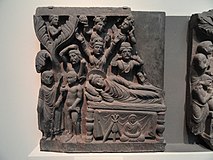Ājīvika
Ajivika (IAST: Ājīvika) is one of the nāstika or "heterodox" schools of Indian philosophy.[7][8] Believed to be founded in the 5th century BCE by Makkhali Gosala, it was a śramaṇa movement and a major rival of Vedic religion, early Buddhism and Jainism.[9] Ājīvikas were organised renunciates who formed discrete communities.[10] The precise identity of the Ajivikas is not well known, and it is even unclear if they were a divergent sect of the Buddhists or the Jains.[11]
Original scriptures of the Ājīvika school of philosophy may once have existed, but these are currently unavailable and probably lost. Their theories are extracted from mentions of Ajivikas in the secondary sources of ancient Indian literature.[12] Scholars question whether Ājīvika philosophy has been fairly and completely summarized in these secondary sources, as they were written by groups (such as the Buddhists and Jains) competing with and adversarial to the philosophy and religious practices of the Ajivikas.[13] It is therefore likely that much of the information available about the Ājīvikas is inaccurate to some degree, and characterisations of them should be regarded carefully and critically.
The Ājīvika school is known for its Niyati ("Fate") doctrine of absolute determinism,[8] the premise that there is no free will, that everything that has happened, is happening and will happen is entirely preordained and a function of cosmic principles.[8][12] Ājīvikas considered the karma doctrine as a fallacy.[14] Ajivika metaphysics included a theory of atoms which was later adapted in Vaisheshika school, where everything was composed of atoms, qualities emerged from aggregates of atoms, but the aggregation and nature of these atoms was predetermined by cosmic forces.[15] Ājīvikas were mostly considered as atheists.[16] They believed that in every living being is an ātman – a central premise of Hinduism and Jainism.[17][18][19]
Ājīvika philosophy reached the height of its popularity during the rule of the Mauryan emperor Bindusara, around the 4th century BCE. This school of thought thereafter declined, but survived for nearly 2,000 years through the 14th century CE in the southern Indian states of Karnataka and Tamil Nadu.[7][14][20] The Ājīvika philosophy, along with the Cārvāka philosophy, appealed most to the warrior, industrial and mercantile classes of ancient Indian society.[21]
Etymology and meaning[]
Ajivika (Prakrit:

